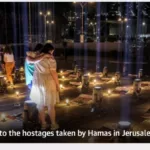In a rare and impassioned two-day emergency debate at the United Nations General Assembly, Arab nations, in solidarity with the Global South, have come together to confront Israel and its Western allies, urging an immediate halt to the bombardment in Gaza.
The Iranian Foreign Minister delivered a stern warning on Thursday, labeling the ongoing violence as “genocide.” He cautioned that should this relentless assault persist, the United States would not escape the consequences.
This debate raised unsettling questions for the United States, as diplomats from across the world challenged Washington’s steadfast support for Israel following the tragic Hamas attack that claimed 1,400 lives. According to Palestinian authorities, over 7,000 individuals have now lost their lives in Gaza due to relentless Israeli airstrikes.
The title of the debate itself, “Illegal Israeli Actions in Occupied East Jerusalem and the Rest of the Palestinian Territory,” sets the tone. If a non-binding vote is called on Friday, it is highly likely that a substantial majority of nations in the assembly will condemn Israel’s actions.
Despite these global condemnations, the smaller 15-member UN Security Council, including its five permanent members with veto power, failed to reach an agreement on a humanitarian ceasefire.
Russia and the United States, in a display of opposing positions, vetoed each other’s resolutions on Wednesday. The US had also vetoed a Brazilian resolution last week, contending that it did not sufficiently assert Israel’s right to self-defense.
Notably, resolutions passed by the Security Council carry more weight than those passed by the larger 193-country General Assembly.
Iran’s Foreign Minister, Hossein Amir-Abdollahian, delivered a stark warning, emphasizing the need to halt the genocide in Gaza. He expressed that while an expansion of the conflict was undesirable, should the suffering in Gaza persist, the US would not be immune from its repercussions. He also stressed progress in securing the release of hostages held by Hamas.
Riyad Mansour, the Palestinian Ambassador to the UN, painted a somber picture of the human cost of the conflict. He revealed that numerous Palestinian families had lost ten or more relatives, with some families losing up to 45 members. He questioned the international community’s disparate responses to casualties on both sides.
Jordan’s Foreign Minister, Ayman Hussein Abdullah Al-Safadi, criticized Israel’s rhetoric, accusing the Israeli government of advocating the elimination of Palestinians and degrading them as unworthy of life.
In response, Israel’s Ambassador to the UN, Gilad Erdan, presented a video that he claimed depicted a Hamas fighter attempting to harm a man during the October 7th attack this year.
Erdan underscored that this conflict was not a war with the Palestinian people but with the genocidal Hamas terrorist organization, which he argued cared little for the Palestinian population and aimed solely to annihilate Israel.
In a joint statement, the foreign ministers of several Arab nations, including the United Arab Emirates, Jordan, Bahrain, Saudi Arabia, Oman, Qatar, Kuwait, Egypt, and Morocco, condemned the targeting of civilians and violations of international law in Gaza. They emphasized that the right to self-defense should not justify disregard for Palestinian rights, condemning forced displacement and collective punishment in Gaza. These ministers also called for intensified efforts to implement a two-state solution, an idea that has long served as the foundation of a peace process.
European governments lent their support to Israel, with the German Chancellor, Olaf Scholz, assuring that EU leaders meeting in Brussels would offer unequivocal backing to Israel’s self-defense efforts.
Amid the ongoing violence, Qatar expressed challenges in negotiating the release of hostages held by Hamas, emphasizing the difficulty of the situation with daily bombings. The Qatari Foreign Affairs Minister, Mohammed Al Khulaifi, expressed hope and commitment to their mission.
Turkish President Recep Tayyip Erdoğan conveyed strong disapproval, describing the Israeli attack on Gaza as reaching the level of a massacre. He criticized the international community’s silence on the issue, calling it a shame for humanity, and advocated for an independent, sovereign Palestinian state with East Jerusalem as its capital as the path to lasting peace.







